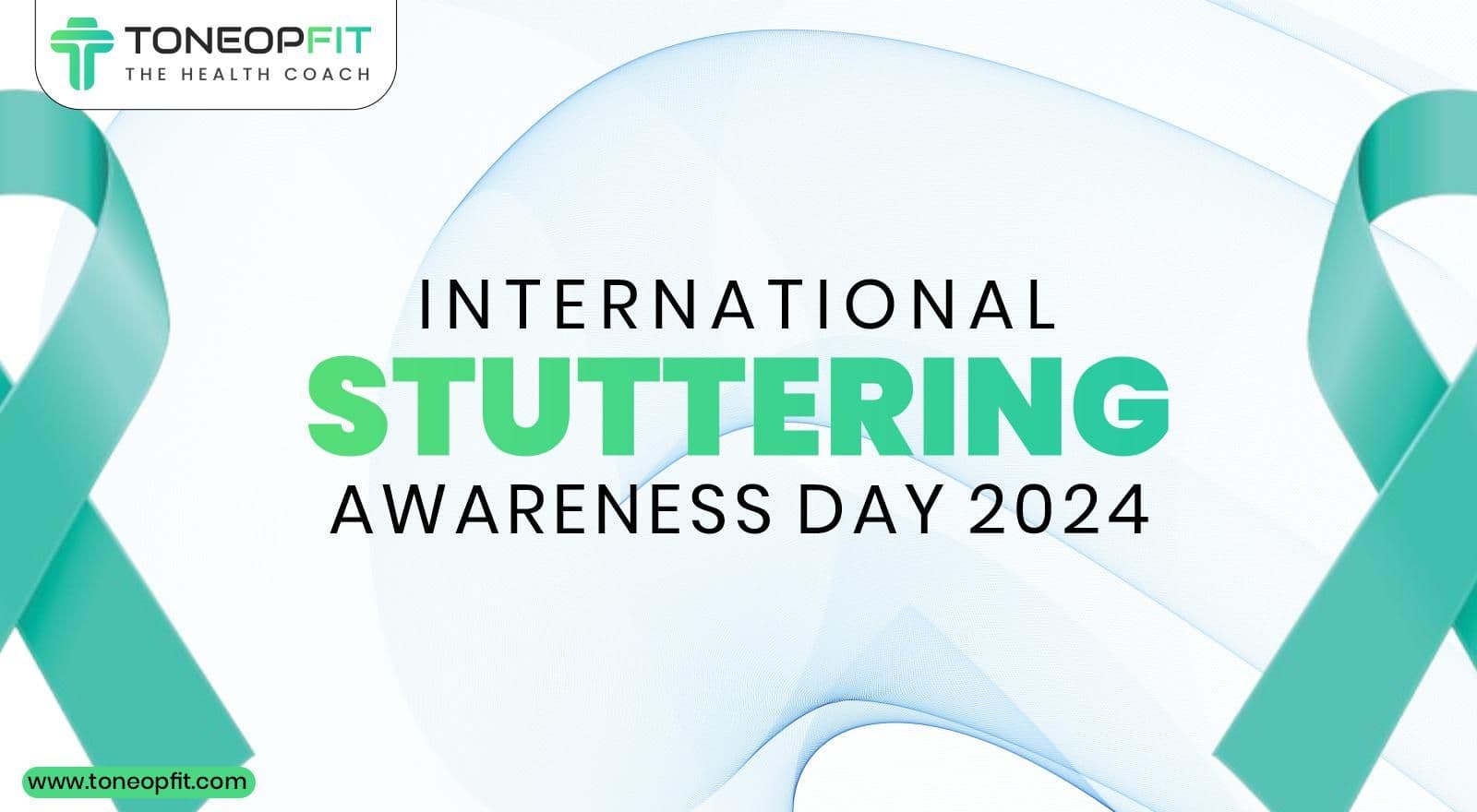The Power Of Listening– People Who Stutter Have The Unique Opportunity To Teach The World To Listen.
International Stuttering Awareness Day is back! It is celebrated every year on October 22nd to raise awareness of the speech disorder that affects about 1% of the global population yet is often misunderstood. This day reminds us that speech disruptions like involuntary repetition and sound struggles aren’t about being nervous or less intelligent.
Stuttering, also known as stammering, causes involuntary word repetition, pauses, and disruptions in speech fluency. A study found that the prevalence of stuttering among school-going children in Dakshina Kannada was 1.68%. It was also found that males were affected more than females, with a ratio of 2.4:1. It’s not about nerves or intelligence—just a different way of communicating! This year, the International Stuttering Awareness Day 2024 theme is all about smashing outdated perceptions and building inclusive conversations where every voice—no matter how it flows—gets heard.
So, why does this day matter? Well, think of it as a global mic drop moment, where stuttering communities worldwide come together to challenge stereotypes, throw out tired myths, and demand more empathy in communication. Since kicking off in 1998, this annual event has become a rallying cry for people who stutter, encouraging the world to shift its mindset. International Stuttering Awareness Day 2024 promises to go even bigger, tackling the subtle and not-so-subtle barriers that stammerers face daily.
This isn’t just a healthcare campaign; it’s a movement for humanising speech, celebrating unique voices, and pushing for change. Ready to listen differently? Let’s break the stigma, support each other, and keep the conversation flowing!
Table Of Contents
- What Is Stuttering?
- History Of International Stuttering Awareness Day
- Why Is The International Stuttering Awareness Day Important?
- Debunking Myths Associated With Stuttering With Facts
- How To Celebrate International Stuttering Awareness Day 2024?
- How Can We Support People Who Stutter?
- Expert’s Advice
- The Final Say
- FAQs
- References
What Is Stuttering?
Stuttering, or stammering, is a speech disorder that disrupts the regular speech flow. It is defined by involuntary repetitions, prolongations, or blocks that disturb the smooth articulation of words. Although disfluency can be experienced by anyone at times, individuals with chronic stuttering often face more frequent disruptions that have a notable influence on their capacity for social engagement and communication.
It’s estimated about 1% of the world’s population stutters, though about 5% of children go through a period of stuttering. Stuttering usually begins in childhood, between the ages of 2 and 5 years. Stuttering can begin gradually and develop over time, or it can appear suddenly.
Stuttering is a complicated condition with multiple possible causes. It is thought to arise from a combination of genetic, neurological, and environmental factors. While research into the exact mechanisms of stuttering is ongoing, advancements in speech therapy, neurological studies, and psychological approaches have provided valuable insights into how to better manage and treat stuttering.
History Of International Stuttering Awareness Day
International Stuttering Awareness Day (ISAD) was initiated in 1998 by Michael Sugarman, a prominent advocate for stuttering awareness. This day is celebrated to promote awareness and support for those who stutter, fostering collaboration between speech-language pathologists and those affected.
October 22 was chosen to coincide with the birthday of Sir George Bernard Shaw, a famous playwright who stuttered, highlighting the importance of empathy and awareness. Since its inception, ISAD has encouraged various activities worldwide to challenge misconceptions and reduce the stigma surrounding stuttering.
Why Is The International Stuttering Awareness Day Important?
Stuttering occurs when speech control is lost, leading to interruptions or "disfluencies" in speech patterns. The term "stuttering" can describe either the particular speech disruptions typically seen in individuals who stutter or the general communication challenges that those with stuttering may face.
Aside from causing speech interruptions, individuals with stuttering often face physical tension and difficulties in their speech muscles, along with feelings of discomfort, nervousness, and apprehension when speaking. These traits combined can create challenges for individuals who stutter when trying to communicate with others, making it hard for them to effectively share their thoughts and ideas. There are a variety of stuttering types and levels, each unique to individuals who stutter.
International Stuttering Awareness Day is celebrated to educate people about this complex condition and their needs and to work towards preventing stuttering in children.
International Stuttering Awareness Day 2024 Theme
This year, 2024, the International Stuttering Awareness Day Theme is “The Power of Listening”. The theme highlights the opportunity for people who stutter to teach others to listen, which can help build trust and understanding.
Debunking Myths Associated With Stuttering With Facts
The following table debunks some myths associated with stuttering:
Myth | Fact |
| People stutter because they are nervous. | Nervousness can occur due to stuttering, but it is not the underlying cause of the disorder. |
| Stuttering is primarily a psychological issue. | While emotional factors may accompany stuttering, it is primarily a neurological condition. |
| Emotional trauma causes stuttering. | Trauma may trigger stuttering in predisposed children, but it is not typically the main cause. |
| Stuttering is just a habit that can be broken. | Stuttering is not a habit; it is a neurological condition that often persists despite efforts to change. |
| Forcing a left-handed child to be right-handed causes stuttering. | This belief has been disproven; stress from such attempts might increase stuttering but does not cause it. |
| Avoid discussing stuttering with children. | Open conversations about stuttering help children understand and self-advocate, reducing stigma. |
| People who stutter are shy and self-conscious. | Many who stutter are assertive and confident, succeeding in various fields, including leadership roles. |
| Stuttering indicates lower intelligence or capability. | People who stutter excel in many professions, proving that stuttering does not reflect intelligence. |
| Bad parenting causes children to stutter. | Stuttering is not the result of parenting; environmental stress can exacerbate it but does not cause it. |
| Children imitate a stuttering parent or relative. | Stuttering is not contagious; genetic predisposition plays a role, not imitation. |
| Labelling a child as a stutterer leads to chronic stuttering. | Discussing stuttering does not cause it; this outdated belief has been discredited for decades. |
| Bilingualism causes stuttering. | There is no evidence linking bilingualism to the development of stuttering; it can offer many benefits instead. |
| People who stutter need to slow down their speech. | Stuttering is not caused by speaking too quickly; individuals may need more time to express themselves clearly. |
How To Celebrate International Stuttering Awareness Day 2024?

Taking part in International Stammering/Stuttering Awareness Day enables you to show your support for people who stutter and encourage awareness and empathy. Here are some valuable ways to participate:
Ways to Celebrate International Stuttering Awareness Day 2024 | |
| Wear a Ribbon | Show your support by wearing a blue or purple ribbon linked to stuttering awareness. |
| Share Stories | Encourage individuals who stutter to share their personal experiences to raise awareness and reduce stigma. |
| Host Workshops | Organise workshops or discussions in your community or workplace to educate others about stuttering and its challenges. |
| Advocate for Resources | Push for more speech therapy services and resources to support those with speech impediments. |
| Use Inclusive Language | Promote the use of inclusive language and patient communication when interacting with individuals who stutter. |
| Join Social Media Campaigns | Participate in social media initiatives and share educational posts to spread awareness. Use hashtags:
|
Also Read: World Arthritis Day 2024: How Arthritis Affects Your Life? Understanding The Causes And Prevention
How Can We Support People Who Stutter?
On this International Stuttering Awareness Day, you can support people who stutter by:
1. Promote Active Listening
When talking to someone who stutters, listen patiently. Don’t interrupt or finish their sentences. This shows you respect them and helps them feel comfortable speaking.
2. Raise Awareness
Join in on awareness events like International Stuttering Awareness Day. Share information about stuttering with your friends and family. The more people know about it, the more understanding they will be.
3. Promote Workplace Inclusion
To help employees who stutter feel included at work, employers should create a friendly environment. They can offer different ways to communicate, like using emails or instant messages, so people don’t feel as much pressure when speaking. Providing access to speech therapy and giving extra time for presentations can also make employees feel more at ease. This way, people who stutter can feel confident sharing their ideas.
4. Encourage Speech Therapy
Help individuals who stutter by encouraging them to utilise speech therapy and counselling services, as these resources can equip them with the necessary skills to handle their speech difficulties and overcome any emotional or psychological obstacles they encounter. Accessing these services is essential in enabling individuals who stutter to achieve their maximum capabilities.
Expert’s Advice
On this International Stuttering Awareness Day, I encourage everyone to take meaningful steps to support those who stutter.
First, practice active listening; it’s vital to be patient and allow them to express themselves without interruptions. I’ve found that showing genuine interest in their stories helps build trust and confidence.
Second, get involved in awareness campaigns; sharing information about stuttering can help dispel myths and promote understanding in your community. Lastly, consider advocating for inclusive environments, especially in workplaces and schools, where individuals who stutter can feel safe and valued.
Health Expert
Akshata Gandevikar
The Final Say
International Stuttering Awareness Day 2024 strongly reminds us to end the silence surrounding stuttering and encourage people who stutter to accept their distinct voices. By learning more about stuttering and sharing this knowledge, we can create a friendlier world where everyone feels accepted. It's important to understand that every voice matters, and together, we can help those who have felt quiet for too long. Let’s celebrate each unique voice and encourage everyone to speak up!
FAQs
1. What causes stuttering?
The exact cause of stuttering isn’t fully known. It seems to happen because of a mix of things like genetics, how the brain works, and the environment around the person. Some studies suggest that differences in brain function might affect how people speak. Stuttering can also run in families, meaning it might be passed down from parents to children.
2. Can stuttering be cured?
Stuttering doesn’t have a permanent cure, but it can be managed with help from speech therapy, cognitive-behavioral therapy, and other supportive methods. These treatments help people stutter less often and with less intensity. They also boost confidence and improve communication skills. The goal of therapy isn’t to speak perfectly fluently but to help people communicate better and reduce the emotional challenges that stuttering can bring to their lives.
3. What are the common misconceptions about stuttering?
Many people believe some myths about stuttering, like thinking it’s caused by being anxious or not being smart enough. But these ideas are not true. People who stutter are just as smart as those who don’t. Stuttering is a neurological issue, and it doesn't mean someone is less capable.
4. How can I support someone who stutters?
To help someone who stutters, be a good listener. Don’t interrupt them or finish their sentences. Let them speak at their own pace without rushing them. It’s also helpful to learn more about stuttering so you can understand what they go through. Showing kindness and support can really boost their confidence!
References
- https://awarenessdays.com/awareness-days-calendar/international-stammering-stuttering-awareness-day-2024/
- https://www.pacehospital.com/international-stuttering-awareness-day
- https://www.indiatoday.in/information/story/international-stuttering-awareness-day-2024-history-and-all-you-need-to-know-2620567-2024-10-22
- https://westutter.org/facts-about-stuttering/
- https://cegh.net/article/S2213-3984(23)00114-8/pdf#:~:text=This%20data%20would%20be%20of,pre%2D%20vention%20and%20management%20strategies.&text=Little%20is%20known%20about%20the,across%20rural%20and%20urban%20population.&text=Aiswarya%20LizVarghese%2C%20Dr.,:%20Writing%2D%20Reviewing%20and%20Editing.&text=None.
- https://www.betterspeech.com/post/how-to-help-someone-who-stutters
- https://districtspeech.com/how-to-support-somebody-who-stutters/
About ToneOp Fit
ToneOp Fit is a platform dedicated to improving and maintaining good health through a comprehensive range of goal-oriented health plans with up to 3 Coach support. With a range of Weight Management, Medical Condition, Detox Plans, and Face Yoga Plans, the app also provides premium health trackers, recipes and health content. Get customised diet, fitness, naturopathy & yoga plans and transform yourself with ToneOp.








































